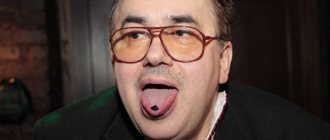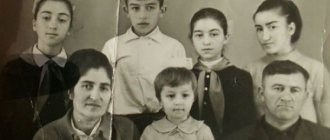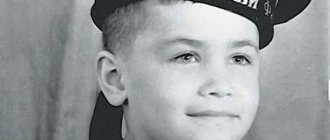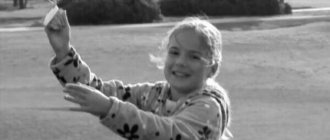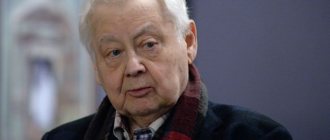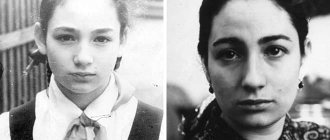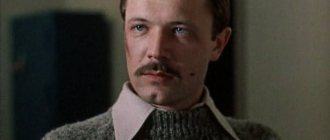| FULL NAME: | Govorukhin Stanislav Sergeevich |
| Date of Birth: | 29.03.1936 |
| Place of Birth: | Berezniki |
| Zodiac sign: | Aries |
| Activity: | Director, screenwriter, producer, actor |
| Date of death: | 14.06.2018 (82 years old) |
A talented person is talented in everything - this can be said about Stanislav Govorukhin, a great director, producer and talented actor. Although fate did not always favor the future screenwriter, he lived with a thirst for life and tireless creative energy.
Stanislav Govorukhin and Vladimir Vysotsky
Childhood and youth
In 1936, on March 26, the iconic future director was born. This event took place in the city of Berezniki, Perm region. He was raised by his mother, Praskovya Afanasyevna Glazkova , who worked part-time as a simple seamstress. He did not know his father; his parents divorced long before the boy was born. Don Cossack Govorukhin Sergei Georgievich died under strange circumstances around 1938.
In the Govorukhin family there was a blacksmith - the great-grandfather of the master Trofim Vasilyevich , and a village teacher - grandfather Afanasy Trofimovich . Stanislav Sergeevich’s grandmother, Zoya Ksenofontovna, was a housewife all her life. The family had two children, the older sister Inessa and Stanislav himself.
The mother never remembered the children's father because she did not want anyone to know that he was repressed. She raised herself and earned a living. She died early, she was barely 52 years old. Only after she left, the grown-up children submitted a request about their father to the KGB and found out that Sergei Georgievich was sent into exile, where he either died or was shot.
As a young man, Stanislav was very interested in mountaineering . This hobby contributed to the fact that in the future he performed all the complex stunts and maneuvers in films on his own. In addition to his main hobbies, the young man loved painting and beautiful symphonic music.
After graduating from high school, Govorukhin entered the Geological Institute in Kazan. But after receiving his diploma, he realizes that being a geologist is not for him. At that same time, Soviet television began to emerge throughout the country, and the first studios also appeared in Kazan. This element plunged Stanislav into a whirlpool; he created his own programs and worked as a cameraman.
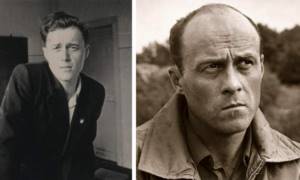
Stanislav Govorukhin in his youth
Childhood
After school, Stanislav Sergeevich entered the Faculty of Geology in Kazan. Later he received his diploma and realized that he had a different calling. It was precisely in those years that television was born; the first studios appeared in Kazan. Therefore, Govorukhin completely immersed himself in this industry.
He worked a lot as a program author, as well as a cameraman and, of course, a director. Much later, Stanislav Sergeevich will remember with gratitude this period of his life, considering it the most creative.
Which countries will compete for Russian tourists this summer?
Buyer buys piece of Banksy graffiti wall for six figures
“Someone also likes me”: Sobchak commented on her appearance with humor
In the early sixties, the future domestic director Govorukhin decided to move to the capital. The man was pushed to this decision by difficult relations with the leadership of Kazan. In Moscow, Stanislav Sergeevich entered VGIK and graduated from the university with honors.
The future famous director always dreamed of working in Odessa, although he had never been to this city. Everyone's favorite films were shot at the Odessa studio.
Dates and events
- 1961 - Arrival in Moscow, enrollment in the Faculty of Directing at VGIK. The birth of his son Sergei, who later became a director.
- 1966 - graduated from the institute with honors, the diploma was a script for a film called “Vertical”, in which Vladimir Vysotsky starred in the title role.
- 1966-1988 — work as a director at a feature film studio in Odessa.
- 1988 - organizer of the Golden Duke festival, which had international status.
- 1988-1993 - work as a director at Mosfilm, membership in the Union of Cinematographers.
- The 1990s dragged director Govorukhin into politics. The film “You Can’t Live Like This” was released on the screens of the country, which became a political act, an expression of the position of a citizen.
- In 1993, Stanislav Govorukhin was elected to the State Duma of the Russian Federation, where he became the head of the Russian Democratic Party faction and was the chairman of the emergency commission to investigate the causes of the situation in Chechnya.
- 1994-2005 — a war correspondent participated in combat operations in Chechnya and Afghanistan, was awarded several military awards, was wounded, and as a result lost a leg. During the same period, filming began on a film about modern wars in Russia.
- 1995 - the split of the Democratic Party was the reason for the creation of the Govorukhin bloc, State Duma deputy.
- 1995-1999 - appointment as chairman of the Committee on Arts and Culture.
- 1996 - creation of the Regional Public Organization of Disabled Veterans, served as chairman of the foundation.
- In 1999, S. Govorukhin was again elected as a deputy from the Fatherland - All Russia bloc.
- In 2000, he nominated himself for the post of President of Russia.
- 2011 - only son Sergei died of a stroke.
- 2012 - member of United Russia, head of the presidential staff.
- In 2013, he was one of the chairmen of the Central Staff of the Popular Front.
- 2014 - support for Putin’s policies in Crimea and Ukraine.
- 2016 - State Duma deputy from the United Russia party.
- June 14, 2021 - Stanislav Govorukhin died of acute heart failure. This happened in the Barvikha sanatorium in the Moscow region, where the director was undergoing treatment.
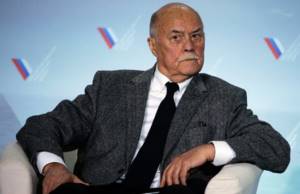
Meeting with Solzhenitsyn
Alexander Solzhenitsyn gave his interview to domestic journalists almost twenty years after his expulsion from the Soviet Union to Stanislav Sergeevich.
According to Alexander Isaevich’s wife, they were offered journalists from Ostankino, but her husband wanted Govorukhin to do the interview. They were unfamiliar with him, but before this event they had seen the film “You Can’t Live Like This,” and Solzhenitsyn had the feeling that his heart was breaking just like Stanislav’s. That's why he only wanted to talk to this person.
In the early nineties, Govorukhin met Solzhenitsyn and visited him twice in Vermont (USA). Solzhenitsyn, according to him, enlightened the director on many issues. As a result, Stanislav Sergeevich and the entire film crew came to the United States of America to visit Alexander Isaevich, where the film “Alexander Solzhenitsyn” was filmed.
Aura of Imagination: Miniature Installations by Unknown Artists in Cambridge
Russian women are deprived of maternity capital: how they do it and how to prevent it
Homemade spray for a clean shower. Apply daily and do not need to be washed off
Personal life
The master's first wife was Juno Karaeva , but this union did not last long, and the couple separated. From this relationship, on September 1, 1961, a son was born, named Sergei .
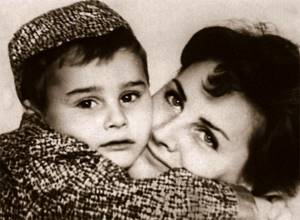
First wife Juno with son Sergei
He followed in his father's footsteps and graduated from the directing department. The men practically did not communicate, due to the boy’s childhood grievances related to the fact that his father left the family and betrayed his son. But when Sergei, at the age of 50, was hospitalized with a stroke, his father dropped everything and came to him. He was there until the last breath of his adult child.
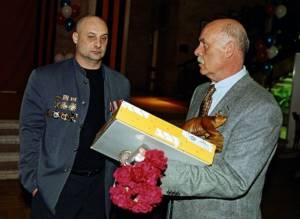
With son Sergei
The second time Stanislav Sergeevich married Galina Borisovna , who worked as an editor at a film studio in Odessa. Galina turned out to be a very wise and diplomatic woman who loves her addicted husband.
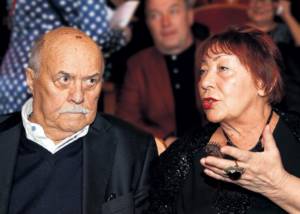
With his second wife Galina
She forgave him all the weaknesses and affairs that happened in his creative life. And the artist was indeed often interested in young actresses. Among them was Svetlana Khodchenkova , whose talent was revealed to Russian cinema by the director in his film Bless the Woman . This passion was so strong that the master asked his wife for a divorce. However, the smart woman did not meet him halfway, because she was sure that the fiery passion would quickly fade away, and so it happened.
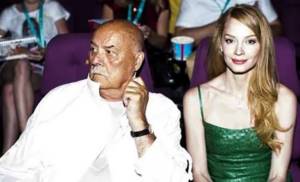
With Svetlana Khodchenkova
The next muse was actress Anna Gorshkova , who starred in the movie “Passenger,” but this relationship was destined to end. Each time, after an unsuccessful romantic relationship, Govorukhin returned to his wife, who, as always, forgave and understood that such a creative unique needed inspiration and thrills.
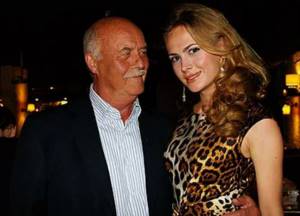
With Anna Gorshkova
In the last years of his life, Stanislav Sergeevich was ill for a long time; he had problems with his lungs. On the advice of friends, he went to Israel, where he underwent surgery to remove a lung. Despite advanced Israeli medicine and good surgeons, the operation was unsuccessful.
On June 14, at the age of 83, the heart of the legendary man stopped beating. A farewell ceremony for Stanislav Sergeevich Govorukhin took place in the Transfiguration Church of the Cathedral of Christ the Savior. Russian President Vladimir Putin personally paid tribute to the memory of the great creator. The master was buried at the Novodevichy cemetery.
Life and work of Stanislav Govorukhin
The first films of the popular director were “The Pharmacist” and “Contraband”. In 1966, Govorukhin arrived in Odessa, and the talented director was immediately offered to work on a film about climbers. As Stanislav Sergeevich recalls, the script for the film was very simple. Then the screenwriter and film director invited Vladimir Semenovich Vysotsky to play the main role, and a couple of months later, domestic viewers watched the film “Vertical” with admiration.
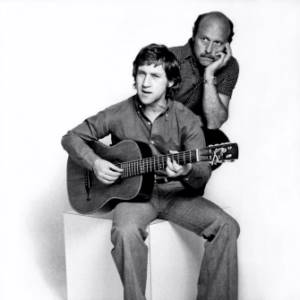
Three years later, the screenwriter made another film about climbers. But, unfortunately, he could not repeat the success of the first film. In the late seventies, the film director created a youth adventure film about cadets of naval schools.
Scientists extract DNA from the bone of a cave bear: the animal lived 360,000 years ago
We take soap bubbles and go out into the cold: mother and son make real masterpieces
“You always have to love”: Andrei Myagkov about life, art and love
Stanislav Sergeevich worked for twenty-two years at the Odessa Film Studio, then returned to Moscow and got a job at Mosfilm. Subsequently, the famous director and screenwriter heads the structural division of Mosfilm.
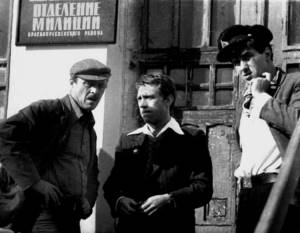
Passion for painting
In the nineties, Govorukhin began to get involved in painting. It all started with simple sketches that were created while attending various film meetings.
Later, Stanislav Sergeevich began to do landscape work using oil paints. Govorukhin even managed to organize three exhibitions of his paintings.
Which white shirts should you get rid of before spring: in 2021 they are no longer in fashion
Making a comfortable cat hammock with your own hands: a very simple way
“Electra”, in tune with our time: the premiere of the opera took place in St. Petersburg
Film work
In 1959–1961 Stanislav Govorukhin worked at the Kazan television studio. “I can call those two years that I worked there the most creative in my biography: we learned a new business. I was a Swede, a reaper, and a pipe player: an editor, a cameraman, a presenter, and an author. Well, from television there is a direct road to cinema,” Govorukhin said in his biography.
In 1961, Govorukhin moved to Moscow and entered the directing department of the All-Union State Institute of Cinematography (VGIK). In 1967 he graduated with honors.
Article on the topic
Ulyanov should shoot, Vysotsky should not sing. The world of cinema by Stanislav Govorukhin The first full-length film was the film “Vertical”. “We thought about it, tossed it around and decided to make a poem about mountains, about mountaineering. They invited Volodya Vysotsky to act in the film and hired the wonderful composer Sonya Gubaidullina. Now she is one of the favorite composers among lovers of serious music,” said Govorukhin. — It was the film “Vertical”. A flexible disc was released with songs from the film: Vysotsky became known throughout the country.”
From 1966 to 1988 Stanislav Govorukhin was a director at the Odessa Feature Film Studio. In 1988, he participated in the organization of the Soviet International Genre Film Festival "Golden Duke", which was held in Odessa from 1988 to 1991. “After that, Kinotavr and Nika will appear. But our festival was the first. It was not just a success, it became a national holiday,” noted Govorukhin.
From 1988 to 1993 he worked at Mosfilm and was a member of the Union of Cinematographers of the USSR (until October 1993). Since December 1991 he was a member of the Confederation of Cinematographers' Unions.
The most famous feature films directed by Govorukhin are “The Meeting Place Cannot Be Changed” (1979), “The Adventures of Tom Sawyer and Huckleberry Finn” (1981), “In Search of Captain Grant” (1885), “Ten Little Indians” (1987), “Sons of Bitches” (1990), “Voroshilov Shooter” (1999), “Bless the Woman” (2003). “Of course, viewers consider the film “The Meeting Place Cannot Be Changed” to be the pinnacle of my work. In the first years, during the screenings, the country died out: crimes stopped and national holidays were disrupted, people sat in front of their televisions,” noted the director.
Article on the topic
“The Meeting Place”, or the Era of Zheglov. How the legendary film was created Govorukhin has many memorable acting works to his credit. He played the role of Alexander Pavlovich Kutepov in the film “Marshal of the Revolution” (1978), Krymov in “Assa” (1987), writer Sergei Popov in “Children of Bitches” (1990), etc.
In addition, Stanislav Govorukhin became famous as the author of more than twenty film scripts, including “Contraband” (1974), “Pirates of the 20th Century” (1979), “Invasion” (1980), “In Search of Captain Grant” (1985), etc. He is also the author of three books: “The Great Criminal Revolution”, “Land of Thieves”, “The Unknown About the Known”.
In addition to feature films, Govorukhin made documentaries and film journalism. In the late eighties, he worked on a film interview with Alexander Solzhenitsyn about the life and work of the writer. Then his author’s trilogy came out: “You Can’t Live Like This” (1990), “The Russia We Lost” (1992), “The Great Criminal Revolution” (1994). “The last film expressed all my disappointment with what happened in the country. They planned democratic reforms, but they turned out to be criminal. And given that our country is huge, I called this criminal revolution great. These newspaper speeches and film journalism can be considered the beginning of my journey into big politics,” Govorukhin wrote in his biography.
Currently, Stanislav Govorukhin is the artistic director of the Vertical film studio of the Mosfilm film concern.
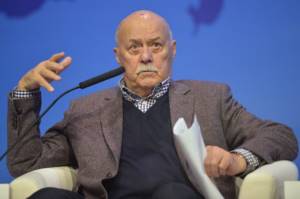
Stanislav Govorukhin: “I despise the mediocre and stupid...” Read more
